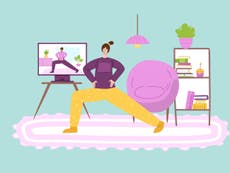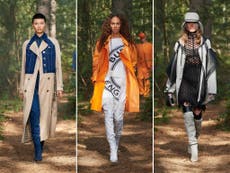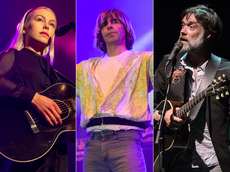Why live-streamed gigs and moshing from home should stay
Music is best shared – we should keep virtual concerts after coronavirus so everyone can be part of the experience

Your support helps us to tell the story
From reproductive rights to climate change to Big Tech, The Independent is on the ground when the story is developing. Whether it's investigating the financials of Elon Musk's pro-Trump PAC or producing our latest documentary, 'The A Word', which shines a light on the American women fighting for reproductive rights, we know how important it is to parse out the facts from the messaging.
At such a critical moment in US history, we need reporters on the ground. Your donation allows us to keep sending journalists to speak to both sides of the story.
The Independent is trusted by Americans across the entire political spectrum. And unlike many other quality news outlets, we choose not to lock Americans out of our reporting and analysis with paywalls. We believe quality journalism should be available to everyone, paid for by those who can afford it.
Your support makes all the difference.Thanks to Covid-19, there hasn’t been a proper gig in the UK since Stereophonics ignored public safety and played at Cardiff’s Motorpoint Arena on Lockdown Eve. Instead, we’ve seen artists embrace the live-stream to stay connected to their fans, raise money for charity, and keep everyone away from baking yet another loaf of sourdough.
From the early days of going live on Instagram armed with nothing but an acoustic guitar to the full production, empty venue takeovers of Biffy Clyro and Nick Cave, live-stream’s ability to provide a fleeting moment of near-normality has become a vital part in being a music fan right now. I hope they stick around forever.
I agree with Izzy B. Phillips from art punks Black Honey that “a live-streamed gig will never compare with the connection and the intimacy you can have with somebody in the same room. There's something about sharing a space and looking someone in the eye that's really important,” but what if you could have the choice.
If you can’t afford the ticket, have no way of getting to the city the band are playing in, or just don’t feel like leaving the house, a live-streamed gig could make it feel like you weren’t missing out. “You’d get an opportunity to show your fans in Mexico what's going on at your hometown show in Brighton, which they normally wouldn’t get,” Izzy adds, remembering the “play South America" messages written under every one of their YouTube videos and tour announcements.
The likes of singer-songwriter Declan McKenna and progressive metallers Code Orange have taken over empty venues for their lockdown album launch gigs, while indie songsmith Phoebe Bridgers celebrated the release of her second record Punisher with a tour of her house, performing from the kitchen, bedroom, and bathroom.
Fans from around the world tuned in when socially-conscious punks Idles took over Abbey Road for a trio of time-zone-aware gigs. “We’ve tried to cultivate fans from all over the world and create a shared community,” the band’s guitarist Mark Bowen tells me. “It was an important thing for those shows to be for all our fans rather than just focusing on the UK ‘cos that’s the only place we can be right now.”
He agrees that live-streams will never replace the excitement of a proper live gig but, “what they can do is give you a new perspective on the music you already have. The context is really important. With our shows, you felt the energy of the band rather than the exchange or energy between the audience and the band.”
Like so many musicians, both Izzy and Bowen miss playing live and are eagerly awaiting the return of proper gigs (assuming the government eventually provides enough funding to stop them all closing down). They want live-streams to continue alongside them though. “In the future, I’d like to take it somewhere new or different though. Watching bands from places where you wouldn’t usually be able to see them is an interesting thing to play with. Live-streams will always have a place though.” They’re not the only ones who want them to become part of a new normal.
While this explosion of digital events is being heralded as a victory for accessibility, there’s still work that needs to be done so everyone is included. The forced move online has opened up opportunities for people to access things in a way they haven’t been able to previously, but “the risk is that in the rush to innovate, access gets forgotten about,” Jacob Adams from music access company Attitude Is Everything tells me, acknowledging that a lot of streams aren’t taking everyone into consideration.
Adams’s charity, which works to improve deaf and disabled’s people’s exposure to live music, has just released an access guide for online events and after the surge of digital gigs and looking to the future, he’s excited about the potential. “If we get to a point where it’s the norm for physical events to also have streaming options, that opens up some interesting choices for people with access requirements. Consumer choice is king though, when physical events return live-streaming can never be seen as a replacement for physical accessibility.”
Right now live-streamed gigs are a necessity, but when proper gigs return I hope they’ll remain a vital part of the scene as long as everything is done to make them as open as possible. As Jacob explains: “Access is in every artist’s interest because it helps you reach as wide an audience as possible.” Live music is at its best when it’s a shared experience and live-streams make it open to as many people as possible. It’s a very anti-2020 sentiment but the more, the merrier.




Join our commenting forum
Join thought-provoking conversations, follow other Independent readers and see their replies
Comments